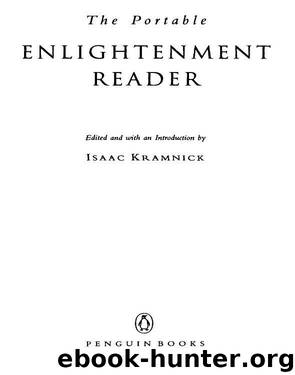The Portable Enlightenment Reader by Isaac Kramnick (ed.)

Author:Isaac Kramnick (ed.) [Kramnick, Isaac]
Language: eng
Format: epub
Publisher: PENGUIN group
Published: 0101-01-01T00:00:00+00:00
ON THEATER AND MORALS
JEAN-JACQUES ROUSSEAU
D‘Alembert wrote the entry for “Geneva” in the Encylopédie, in which he criticized its prohibition of theater. Rousseau replied in 1758 in his Epistle to Mr. d’Alembert, arguing not only that theater encouraged idleness and inactivity but that it left people alone with only themselves. A republic required truly public entertainment, he concluded, which would promote civic spirit.
The state of man hath its pleasures, which are derived from his nature, and arise from his occupations, his connections and his necessities; and as these pleasures are most agreeable to uncorrupted, innocent minds, they render all others in a manner useless. A father, a son, a husband, a citizen, lie under obligations of so pleasing and interesting a nature, that they can want no amusement more agreeable than the discharge of them. The proper employment of our time increases its value; while the better it is employed, the less have we still to spare. Thus we find that the habit of labor renders idleness tiresome, and that a good conscience deprives us of all taste for frivolous pleasures. But it is the being dissatisfied with ourselves; it is the weight of indolence; it is the loss of taste for simple and natural pleasures, that give occasion to the expediency of artificial entertainments. I do not like to see the heart set upon theatrical amusements, as if it was uneasy or unhappy within itself. The answer of the barbarian to a person who had been extolling the magnificence of the circus, and the games instituted at Rome, was dictated by nature itself Have the Romans, said that honest creature, no wives nor children? The barbarian was in the right. People imagine themselves to be in company at the theater, but it is there that everybody is alone. We repair thither to forget our relations, our friends, our neighbors; to interest ourselves in fabulous representations, to mourn over the imaginary misfortunes of the dead, or to laugh at the expense of the living. But I should have perceived that this is not the language of the present age. Let us endeavor, therefore, to assume one that will be better understood.
To enquire whether public amusements are good or bad in themselves is a question too vague and indeterminate: it would be to examine into a relation before we had fixed the terms of it. They are made for the people, and it is only from their effects on the people, that we are to determine their real good or bad qualities. There may be an almost infinite variety of such entertainments; and there is a like variety in the manners, constitutions and characters of different people. I allow that man is every where the same; but when he is variously modified by religion, government, laws, customs, prepossessions, and climates, he becomes so different from himself that the question no longer is what is proper for mankind in general, but what is proper for him in such a particular age and country.
Download
This site does not store any files on its server. We only index and link to content provided by other sites. Please contact the content providers to delete copyright contents if any and email us, we'll remove relevant links or contents immediately.
| Ancient & Classical | Arthurian Romance |
| Beat Generation | Feminist |
| Gothic & Romantic | LGBT |
| Medieval | Modern |
| Modernism | Postmodernism |
| Renaissance | Shakespeare |
| Surrealism | Victorian |
4 3 2 1: A Novel by Paul Auster(12358)
The handmaid's tale by Margaret Atwood(7735)
Giovanni's Room by James Baldwin(7307)
Asking the Right Questions: A Guide to Critical Thinking by M. Neil Browne & Stuart M. Keeley(5745)
Big Magic: Creative Living Beyond Fear by Elizabeth Gilbert(5731)
Ego Is the Enemy by Ryan Holiday(5398)
The Body: A Guide for Occupants by Bill Bryson(5067)
On Writing A Memoir of the Craft by Stephen King(4921)
Ken Follett - World without end by Ken Follett(4711)
Adulting by Kelly Williams Brown(4556)
Bluets by Maggie Nelson(4538)
Eat That Frog! by Brian Tracy(4503)
Guilty Pleasures by Laurell K Hamilton(4428)
The Poetry of Pablo Neruda by Pablo Neruda(4083)
Alive: The Story of the Andes Survivors by Piers Paul Read(4013)
White Noise - A Novel by Don DeLillo(3995)
Fingerprints of the Gods by Graham Hancock(3980)
The Book of Joy by Dalai Lama(3963)
The Bookshop by Penelope Fitzgerald(3829)
